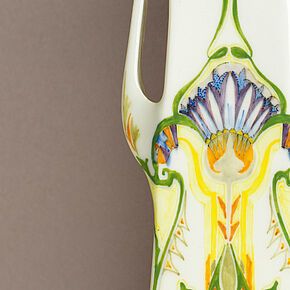
Lot was sold
Lot 14 | Jean-Joseph Lepaute | MONUMENTAL MARBLE CLOCK URANIUM WITH ROTATING PLANETARIUM
Estimate
10.000
- 20.000
€
D
Result:
(incl. premium)
9.240 €
MONUMENTAL MARBLE CLOCK URANIUM WITH ROTATING PLANETARIUM.
Lepaute, Jean-Joseph. Paris
Date: Early 19th c.
Maker/Designer: Model presumably after a draft by Janet.
Technique: Black marble. Bronze partially patinated and gilt. Enamel dial.
Description: Fully sculpted figure of the muse of astronomy on a high relief plinth. In her hand she
holds a compass with which she points to a celestial globe decorated with five-pointed
stars and symbols of the signs of the zodiac. This rests on three dolphins. The
palmette-decorated case serves as a pedestal for the planetarium, on which books and
scientific instruments rest. The dial is framed by a circle of stars. Roman numerals.
Large round pendulum movement with extended winding period, thread suspension, count wheel
and half-hour chime on bell. The celestial globe can be rotated and indicates the
respective star sign with a sun-decorated hand; this planetarium is controlled by the
striking work.
Measurement: 94x64x24cm.
Mark: On the dial inscribed "Lepaute A Paris".
Compass damaged.
Provenance:
Private collection North Rhine-Westphalia.
Literature:
- Tardy: Dictionnaire des Horlogers Français, Paris 1972. Maker see p. 384.
- Hans Ottomeyer und Peter Pröschel: Vergoldete Bronzen, vol. 1, Munich 1986. Model depicted on p. 395, ill.5.18.6.
In addition to its almost monumental size, this pendulum is characterised by the high quality of its moulding. It can therefore be regarded as a masterpiece of Parisian craftsmanship. Other well-known examples of this clock can be found in the Bavarian National Museum, the Grand Trianon in Versailles and the Warsaw Palace.
Urania is the muse of astronomy in Greek mythology; her attributes are a celestial globe and a pointer. In late antiquity, Urania represented the fixed starry sky according to Pythagorean ideas and thus had the highest position in the harmony of the spheres.
The depiction of the pedestal relief is also extremely interesting. In the left-hand panel, we see the personification of the Nile lying in front of a pyramid, an indication that we are in Egypt. On the opposite side are a large number of scholars, presumably Greeks, listening to the words of Eratosthenes, the founder of scientific geography. At his side are Urania and the Genius of Life.
Eratosthenes (ca. 276-194 BC) was a versatile scientist, specialising in mathematics, geography, astronomy, history, philosophy and poetry. For over 50 years he was the director of the Library of Alexandria, presumably the most important library of antiquity. His calculation of the earth's circumference, based on precise measurements, is one of the most important scientific achievements of antiquity.
Lepaute, Jean-Joseph. Paris
Date: Early 19th c.
Maker/Designer: Model presumably after a draft by Janet.
Technique: Black marble. Bronze partially patinated and gilt. Enamel dial.
Description: Fully sculpted figure of the muse of astronomy on a high relief plinth. In her hand she
holds a compass with which she points to a celestial globe decorated with five-pointed
stars and symbols of the signs of the zodiac. This rests on three dolphins. The
palmette-decorated case serves as a pedestal for the planetarium, on which books and
scientific instruments rest. The dial is framed by a circle of stars. Roman numerals.
Large round pendulum movement with extended winding period, thread suspension, count wheel
and half-hour chime on bell. The celestial globe can be rotated and indicates the
respective star sign with a sun-decorated hand; this planetarium is controlled by the
striking work.
Measurement: 94x64x24cm.
Mark: On the dial inscribed "Lepaute A Paris".
Compass damaged.
Provenance:
Private collection North Rhine-Westphalia.
Literature:
- Tardy: Dictionnaire des Horlogers Français, Paris 1972. Maker see p. 384.
- Hans Ottomeyer und Peter Pröschel: Vergoldete Bronzen, vol. 1, Munich 1986. Model depicted on p. 395, ill.5.18.6.
In addition to its almost monumental size, this pendulum is characterised by the high quality of its moulding. It can therefore be regarded as a masterpiece of Parisian craftsmanship. Other well-known examples of this clock can be found in the Bavarian National Museum, the Grand Trianon in Versailles and the Warsaw Palace.
Urania is the muse of astronomy in Greek mythology; her attributes are a celestial globe and a pointer. In late antiquity, Urania represented the fixed starry sky according to Pythagorean ideas and thus had the highest position in the harmony of the spheres.
The depiction of the pedestal relief is also extremely interesting. In the left-hand panel, we see the personification of the Nile lying in front of a pyramid, an indication that we are in Egypt. On the opposite side are a large number of scholars, presumably Greeks, listening to the words of Eratosthenes, the founder of scientific geography. At his side are Urania and the Genius of Life.
Eratosthenes (ca. 276-194 BC) was a versatile scientist, specialising in mathematics, geography, astronomy, history, philosophy and poetry. For over 50 years he was the director of the Library of Alexandria, presumably the most important library of antiquity. His calculation of the earth's circumference, based on precise measurements, is one of the most important scientific achievements of antiquity.
Contact:
| Recommend lot |
Conditions of this Lot
VAT margin scheme, VAT included, but must not be indicated, not refundable
32% buyer’s premium on the hammer price
32% buyer’s premium on the hammer price
Stock Id: 81130-1


